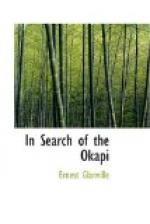“Quinine is an antidote. I mean a preventive—but that is your department, Venning. It will be one of your duties to study the little brute, and you may make a great discovery, for instance, it has been discovered that the mosquito dislikes certain colours. Why? It may be that he would show more distinctly on one colour than on another, and so fall an easy victim to an insect-eating bird. But it may be that the leaves of some plant of a particular hue, or the juices of the plant, are distasteful to the insect. Flies don’t like the leaves of the blue-gum, and I guess mosquitoes have their likes and dislikes. Find the plant they dislike, and we may defy them.”
They had no accommodation for such a luxury as a tent, but instead they purchased canvas hammocks, each with a waterproof covering, and a roll of green canvas with strong eyelet-holes, to serve the purpose of a tent, in addition to a canvas awning with bamboo rods, to cover the whole boat in case they were not able to land for any length of time.
It was a pleasant time for the boys, and when at last they were pitching down the Channel into the Bay of Biscay, having meanwhile passed through a miserable twenty-four hours, they inhaled the strong salt air and clapped each other on the back.
It was grand!
They stood in the bows, one hand on the rail, the other on the brim of a hat, and tasted the salt with a smack of the lips. The wind blew its life into their eyes, brightened them, toughened their skins, reddened them, and the spray, drying on the red, softened the colour to a fine healthy brown. Then the good ship heeled over and rolled back with a swing of the yards, and the first roller from the Atlantic went majestically by. They were on the old, old track of the adventurers, of the sea-rovers, of the great captains, of the empire builders, and before them, far off in the fastness of the Dark Continent, was the Great Forest with all its secrets fast held.
CHAPTER III
THE CANOE ADRIFT
They passed in time the rocks that guard Madeira, the green bay of Funchal, the peak of Teneriffe, and then the ship turned on its heel to the West Coast, and, while yet a thousand miles away, was welcomed by two messengers—a shrike and a hawk-moth, who had sailed along some upper current of air with red sand from the Sahara to filter down at last on to a firm resting-place.
They went away down into the Gulf of Guinea, and with many a call by the way to discharge cargo, approached the mouth of the Congo, whose flood gave a tawny colour to the sea. So far they had seen nothing but the squalid fringe of the Continent, and the damp heat had steamed them and tried them, but the young explorers had not lost the fine edge of their imagination. They knew that hundreds of miles back in the unexplored heart of the land there were secrets to be unraveled, and though they shed their warmer clothing, they retained their ardour. The river somewhere in its far reaches held for them, and them alone, new forms of life—the grandfather of all the crocodiles, a mammoth hippo; and somewhere in the forest was some huge gorilla waiting to offer them battle. Moreover, were these not the gates of the Place of Rest?




